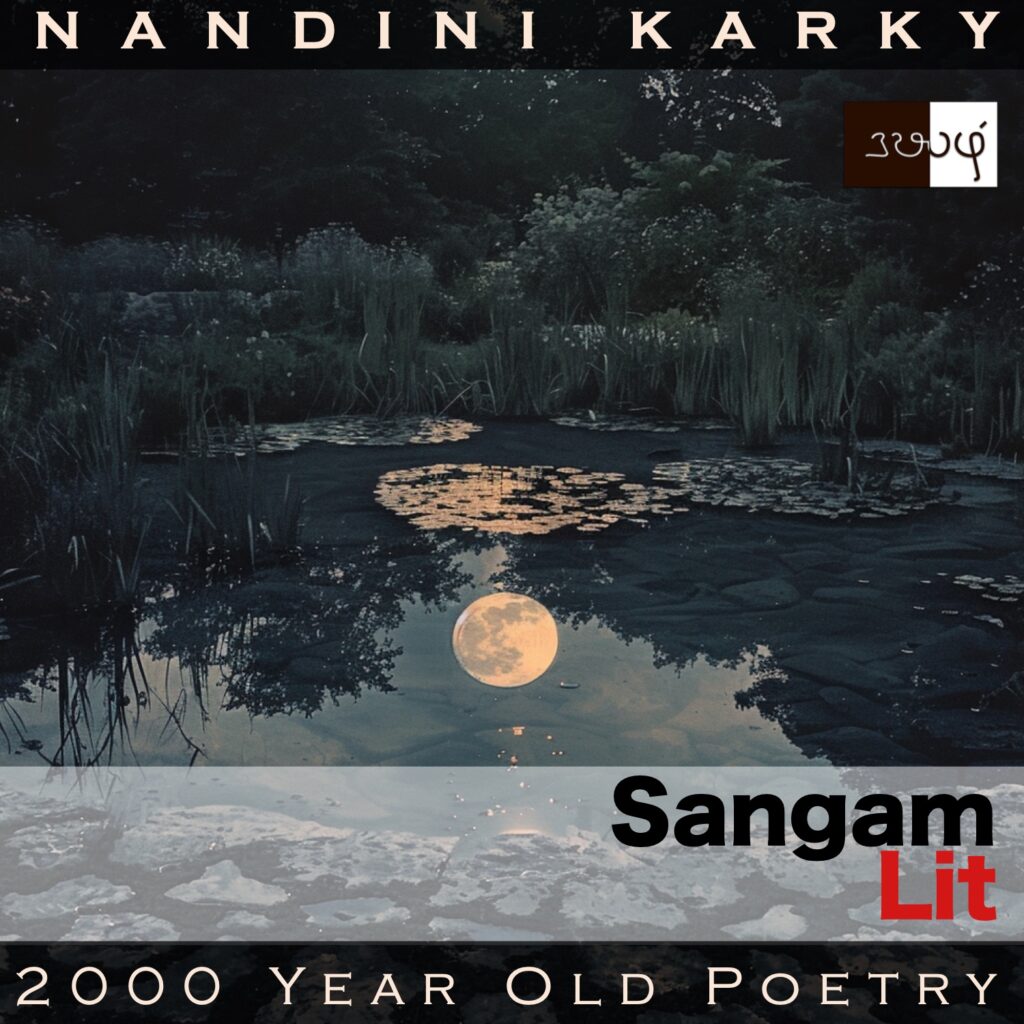Feb 02 2025 6 mins
In this episode, we perceive the transformation in a man, as portrayed in Sangam Literary work, Kalithogai 141, penned by Nallanthuvanaar. The verse is situated in the ‘Neythal’ or ‘Coastal Landscape’ and sketches the success story of a man’s mission.

அரிதினின் தோன்றிய யாக்கை புரிபு தாம்
வேட்டவை செய்து, ஆங்கு, காட்டி மற்று ஆங்கே,
அறம் பொருள் இன்பம் என்று அம் மூன்றின் ஒன்றன்
திறம் சேரார் செய்யும் தொழில்கள் அறைந்தன்று
அணி நிலைப் பெண்ணை மடல் ஊர்ந்து, ஒருத்தி
அணி நலம் பாடி வரற்கு
ஓரொருகால் உள்வழியள் ஆகி, நிறை மதி
நீருள் நிழல் போல், கொளற்கு அரியள் போருள்
அடல் மாமேல் ஆற்றுவேன் என்னை மடல்மாமேல்
மன்றம் படர்வித்தவள் வாழி, சான்றீர்!
பொய் தீர் உலகம் எடுத்த கொடிமிசை
மை அறு மண்டிலம் வேட்டனள் வையம்
புரவு ஊக்கும் உள்ளத்தேன் என்னை இரவு ஊக்கும்
இன்னா இடும்பை செய்தாள் அம்ம, சான்றீர்!
கரந்தாங்கே இன்னா நோய் செய்யும்; மற்று இஃதோ
பரந்த சுணங்கின் பணைத் தோளாள் பண்பு?
இடி உமிழ் வானத்து, இரவு இருள் போழும்
கொடி மின்னுக் கொள்வேன் என்றன்னள் வடி நாவின்
வல்லார் முன் சொல் வல்லேன் என்னைப் பிறர் முன்னர்க்
கல்லாமை காட்டியவள் வாழி, சான்றீர்!
என்று, ஆங்கே,
வருந்த மா ஊர்ந்து, மறுகின்கண் பாட,
திருந்திழைக்கு ஒத்த கிளவி கேட்டு, ஆங்கே,
பொருந்தாதார் போர் வல் வழுதிக்கு அருந் திறை
போல, கொடுத்தார் தமர்.
One more in the series of songs about the man pleading for the lady! The words can be translated as follows:
“Man:
In this rare to attain human life, people live on, doing whatever pleases them. Of the three virtues, namely justice, wealth and pleasure, when one is not attained by a person, there are certain tasks they resort to. And, primary among them, is climbing onto a decorated palmyra horse and singing about the fine beauty of a maiden.
Just once she entered within me, and now, akin to the shadow of the full moon on water, she has become hard to attain. That maiden has made me, the one who has fought in wars many, mounted on a victorious horse, to now climb on a mere palmyra horse and ride it to the town centre. May she live long, O wise elders!
Hard to attain like the flawless orb that soars above this faultless world is the maiden I love. Behold that maiden, who has now rendered to me, the one wants to protect the world entire, the terrible suffering of pleading before others, O wise elders!
By abstaining from me, she has inflicted me with an unbearable affliction. Is this fitting the good nature of this town’s maiden, with spreading pallor spots and bamboo-like arms?
Akin to saying that I can capture the flash of lightning that splits the darkness in the skies that resound with thunder, she has become impossible to reach. That maiden has made me, one who is capable of holding my own before those who speak with perfect tongues, to now show my foolishness before others. May she live long, O wise elders!
Onlookers:
And so, as he rode the horse with angst, and sang in the streets about the maiden, wearing well-etched jewels, hearing these words, akin to how enemies rendered copious tributes, fearing the battle-worthy Vazhuthi, the kin of that maiden offered her in marriage to the man!”
Let’s delve into the details. The verse is situated in the context of the man’s love relationship with the lady, prior to marriage, and here, the man tells his side of the story, followed by the conclusion of the onlookers. The man starts by talking about human lives and how there are certain specific actions that people undertake when they are denied even one of the three facets of life, such as justice, wealth or pleasure. Then, he talks about how one such desperate action is the act of climbing on to a palmyra horse to sing about the beauty of a maiden. Then, he goes on to say how the lady has become rare to attain like the shadow of the moon in water, like the sun that soars above the world, and a flash of lightning in the dark, echoing skies. He mentions how he used to be someone who fought in wars riding a fiery horse, who wished to render with generosity to the world around, and one who shone with intelligence and skill even in the company of great men with perfect tongues. But now, after meeting the lady, he was reduced to one, who had to climb on an illusory symbol of failure – a palmyra horse and had to beg to others, exposing his foolishness before the townspeople.
Now, the onlookers take the centre stage and say that when the man went about singing so, in the streets, the lady’s kin heard about it, and just the way, the enemies of the Pandya King would rush to surrender, and offer gifts and tributes to the king, when he lays siege to them, they too immediately rendered the hand of their girl in marriage to the man. Looks like the man got what he wanted. But is that something the lady too wanted? Is anyone asking that question in that age? Isn’t it interesting how something we would dismiss today as a mad man’s outpouring has been taken so seriously by the people around? And this tells us, without a doubt that what seems so important to the people of an era is rarely seen the same way in the eyes of the future!